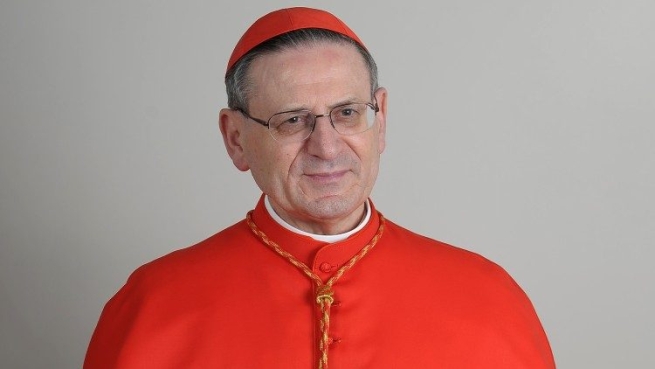‘I give thanks to God for the edifying witness of this spiritual son of St John Bosco who for so many years spent himself with human finesse and generosity for the Gospel and the Church. I think of his priestly spirit and the theological preparation with which he served the Holy See, especially in the Dicastery for the Doctrine of the Faith and in the Dicastery for the Causes of Saints. I assure you of my prayers for the soul of this good servant'. This is how Pope Francis remembers Salesian Cardinal Angelo Amato, in a telegram addressed to the Vicar of the Rector Major, Fr Stefano Martoglio.
Angelo Amato was born in Molfetta (Bari), on 8 June 1938, to a family of shipbuilders. The first of four children, he had undertaken his studies at the Nautical Institute in Bari, in the long-distance captains department. But at the beginning of his third year of studies, in October 1953, he decided to abandon this career to enter the Salesian aspirantate in Torre Annunziata. In 1956, he made his first religious profession. After moving to Rome, he studied at the then Pontifical Salesian Athenaeum (today the Pontifical Salesian University), obtaining a licence in philosophy. In 1962 he made his perpetual religious profession, and began two years of practical training at the Salesian College in Cisternino (Brindisi), where he taught literature in the middle school. After obtaining a licence in theology at the Salesian University's Faculty of Theology in Rome, he was ordained a priest on 22 December 1967.
He enrolled at the Pontifical Gregorian University, and in 1974 obtained a doctorate in theology, being immediately called to teach the subject. In 1977 he was sent to Greece by the then Secretariat for Christian Unity, spending four months in the Jesuits' Athens residence to prepare for university enrolment. After passing the entrance exam (modern written and spoken Greek), he moved to Thessaloniki as a scholarship holder for the Patriarchate of Constantinople. He resided at the Vlatadon Monastery, home of the Orthodox monks' convent and the Idrima ton Paterikon Meleton (Institute of Patristic Studies), with a library specialising in Orthodox theology and a valuable microfilm collection of Mount Athos manuscripts. He then enrolled in the Faculty of Theology at the University of Thessaloniki, attending Jannis Kaloghirou's lectures on the history of dogma and Jannis Romanidis' lectures on systematic dogmatics. At the same time, he conducted research on the sacrament of penance in Greek Orthodox theology from the 16th to the 20th century, which was published in the ‘Análekta Vlatádon’ series (1982).
Back in Rome, he taught Christology in the Faculty of Theology at the Pontifical Salesian University, of which he was Dean from 1981 to 1987 and from 1994 to 1999. From 1997-2000 he was also Vice Rector of the same University. In 1988 he was sent to Washington for studies on the theology of religions and to complete the Christology textbook. He was then appointed consultant to the Congregation for the Doctrine of the Faith, the Pontifical Councils for Promoting Christian Unity and for Interreligious Dialogue, and councillor of the Pontifical International Marian Academy. In 1999 he was appointed Prelate Secretary of the restructured Pontifical Academy of Theology and editor of the newly founded theological magazine ‘Path’. From 1996 to 2000 he was a member of the theological-historical commission for the Great Jubilee of the Year Two Thousand.
Appointed secretary of the Congregation for the Doctrine of the Faith on 19 December 2002 and elected to the titular See of Sila with the personal title of archbishop, he received episcopal consecration on 6 January 2003 from Pope John Paul II in the Vatican Basilica.
On 9 July 2008, Benedict XVI called him to succeed Cardinal José Saraiva Martins as Prefect of the Congregation for the Causes of Saints, and in the Consistory of 20 November 2010 created him Cardinal of the Diaconia of Santa Maria in Aquiro. He participated in the conclave of March 2013 that elected Pope Francis. On 19 December 2013, Pope Francis confirmed him ‘donec aliter provideatur’ as Prefect of the Congregation for the Causes of Saints, a post he left in 2018 shortly before turning 80.
In November 2013, Cardinal Amato closed the diocesan phase of the beatification and canonisation process of Bishop Tonino Bello in Molfetta Cathedral. ‘Freedom of thought and action, appreciation of the laity, education for the young, the value of peace, love for one's neighbour, consideration for the poor,’ said the cardinal, ‘were the teachings’ of Bishop Tonino, bishop of Molfetta from 1982 to 1986. His testimony,' Cardinal Amato emphasised, “tells us that holiness is not a privilege of the few, but a vocation for all,” because we are all called to follow ’Jesus and the theological virtues: faith, hope and charity.
The bishop of Molfetta, Monsignor Domenico Cornacchia, together with the entire diocese, remembers Cardinal Amato ‘with profound gratitude’ as ‘a man of faith and tireless pastor, who served the universal Church and the people of God with great dedication’.
Source: Vatican News


